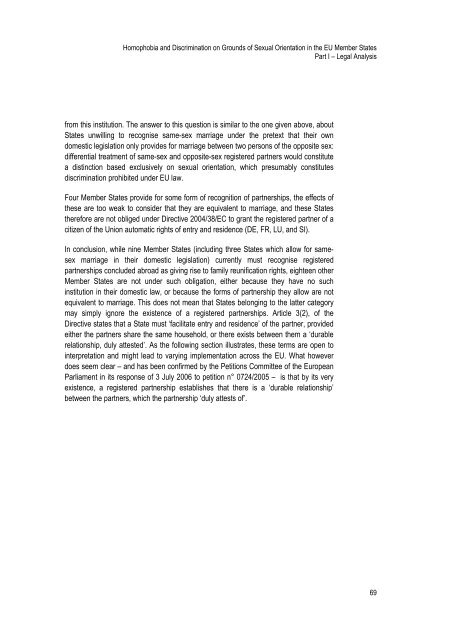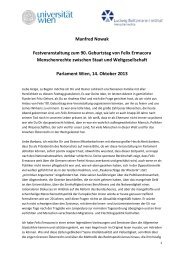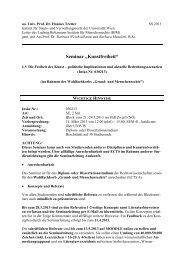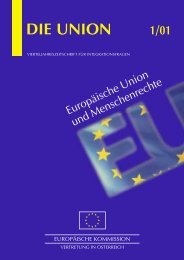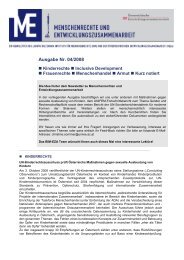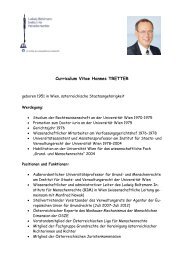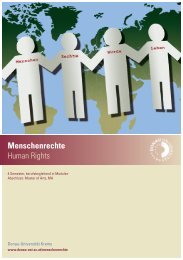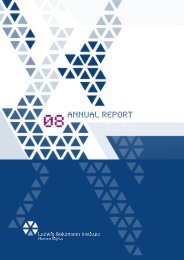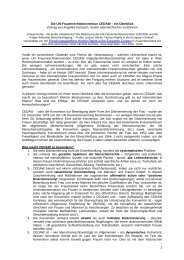European Uni<strong>on</strong> Agency for Fundamental Rights2.3. A same-sex registered partner <strong>of</strong> the citizen <strong>of</strong> theUni<strong>on</strong> seeks to join him or her in another EU MemberStateIn the sec<strong>on</strong>d situati<strong>on</strong> – where the same-sex couple has formed a registeredpartnership in their State <strong>of</strong> origin –, there should normally be no difficulty either if thehost State allows same-sex couples to marry, or if in its domestic law, it has a regime <strong>of</strong>registered partnerships which is equivalent to marriage. Although the Free MovementDirective explicitly menti<strong>on</strong>s <strong>on</strong>ly the latter case, it would be clearly unacceptable for aState not to allow family reunificati<strong>on</strong> <strong>of</strong> a same-sex registered partnership under thepretext that that State allows gays <str<strong>on</strong>g>and</str<strong>on</strong>g> lesbians to marry pers<strong>on</strong>s <strong>of</strong> the same-sex,instead <strong>of</strong> having created an instituti<strong>on</strong> specific to them. Where the host Member Stateneither authorises same-sex marriage nor has a form <strong>of</strong> registered partnershipequivalent to marriage under domestic law, it is not obliged to grant an automatic right <strong>of</strong>entry <str<strong>on</strong>g>and</str<strong>on</strong>g> residence. 109Six Member States have established forms <strong>of</strong> registered partnership in their domesticlegislati<strong>on</strong> with effects equivalent to marriage – i.e., with c<strong>on</strong>sequences identical to those<strong>of</strong> marriage with the excepti<strong>on</strong> <strong>of</strong> the rules c<strong>on</strong>cerning filiati<strong>on</strong> <str<strong>on</strong>g>and</str<strong>on</strong>g> adopti<strong>on</strong>. Thisincludes CZ, DK, FI, SE, <str<strong>on</strong>g>and</str<strong>on</strong>g> the UK (civil partnership), but also HU, although thepartnership introduced in Hungarian legislati<strong>on</strong> will <strong>on</strong>ly enter in force in 2009. TheseStates must recognise registered partnerships c<strong>on</strong>cluded in another Member State forthe purposes <strong>of</strong> family reunificati<strong>on</strong> with a citizen <strong>of</strong> the Uni<strong>on</strong>. BE, ES, <str<strong>on</strong>g>and</str<strong>on</strong>g> the NL –although BE has no ‘registered partnership’ in its legislati<strong>on</strong>, but <strong>on</strong>ly a weak form <strong>of</strong>‘legal cohabitati<strong>on</strong>’ – should also be added bringing the Member States, whereregistered partners may fully exercise their free movement rights, because they allowsame-sex marriage to nine.In 14 other Member States there is no registered partnership in domestic legislati<strong>on</strong>: inthese States, the registered partner <strong>of</strong> a citizen <strong>of</strong> the Uni<strong>on</strong> is therefore not grantedautomatic rights <strong>of</strong> entry <str<strong>on</strong>g>and</str<strong>on</strong>g> residence (BG, EE, EL, IE, IT, CY, LV, LT, MT, AT, PL, PT,RO <str<strong>on</strong>g>and</str<strong>on</strong>g> SK). One <strong>of</strong> these States – Austria – might shortly join the first group, as <strong>on</strong>eparty <strong>of</strong> the governing coaliti<strong>on</strong> unveiled plans to introduce registered partnerships. Twoother States <strong>of</strong> this group plan to introduce registered partnerships, but reserve themexclusively to opposite-sex couples (EL <str<strong>on</strong>g>and</str<strong>on</strong>g> LT). The questi<strong>on</strong> is whether, following theintroducti<strong>on</strong> <strong>of</strong> such legislati<strong>on</strong>, they would be obliged to recognise same-sex registeredpartnerships c<strong>on</strong>cluded abroad, when their own legislati<strong>on</strong> excludes same-sex couples109The Committee <strong>on</strong> Petiti<strong>on</strong>s <strong>of</strong> the European Parliament c<strong>on</strong>firms this in its resp<strong>on</strong>se <strong>of</strong> 3 July 2006 topetiti<strong>on</strong> 0724/2005 (‘a Member State which does not recognise registered partnerships under its ownlaw will not be required to automatically grant partners registered in another Member State the right <strong>of</strong>residence as family members’).68
<str<strong>on</strong>g>Homophobia</str<strong>on</strong>g> <str<strong>on</strong>g>and</str<strong>on</strong>g> <str<strong>on</strong>g>Discriminati<strong>on</strong></str<strong>on</strong>g> <strong>on</strong> <strong>Grounds</strong> <strong>of</strong> <strong>Sexual</strong> Orientati<strong>on</strong> in the EU Member StatesPart I – Legal Analysisfrom this instituti<strong>on</strong>. The answer to this questi<strong>on</strong> is similar to the <strong>on</strong>e given above, aboutStates unwilling to recognise same-sex marriage under the pretext that their owndomestic legislati<strong>on</strong> <strong>on</strong>ly provides for marriage between two pers<strong>on</strong>s <strong>of</strong> the opposite sex:differential treatment <strong>of</strong> same-sex <str<strong>on</strong>g>and</str<strong>on</strong>g> opposite-sex registered partners would c<strong>on</strong>stitutea distincti<strong>on</strong> based exclusively <strong>on</strong> sexual orientati<strong>on</strong>, which presumably c<strong>on</strong>stitutesdiscriminati<strong>on</strong> prohibited under EU law.Four Member States provide for some form <strong>of</strong> recogniti<strong>on</strong> <strong>of</strong> partnerships, the effects <strong>of</strong>these are too weak to c<strong>on</strong>sider that they are equivalent to marriage, <str<strong>on</strong>g>and</str<strong>on</strong>g> these Statestherefore are not obliged under Directive 2004/38/EC to grant the registered partner <strong>of</strong> acitizen <strong>of</strong> the Uni<strong>on</strong> automatic rights <strong>of</strong> entry <str<strong>on</strong>g>and</str<strong>on</strong>g> residence (DE, FR, LU, <str<strong>on</strong>g>and</str<strong>on</strong>g> SI).In c<strong>on</strong>clusi<strong>on</strong>, while nine Member States (including three States which allow for samesexmarriage in their domestic legislati<strong>on</strong>) currently must recognise registeredpartnerships c<strong>on</strong>cluded abroad as giving rise to family reunificati<strong>on</strong> rights, eighteen otherMember States are not under such obligati<strong>on</strong>, either because they have no suchinstituti<strong>on</strong> in their domestic law, or because the forms <strong>of</strong> partnership they allow are notequivalent to marriage. This does not mean that States bel<strong>on</strong>ging to the latter categorymay simply ignore the existence <strong>of</strong> a registered partnerships. Article 3(2), <strong>of</strong> theDirective states that a State must ‘facilitate entry <str<strong>on</strong>g>and</str<strong>on</strong>g> residence’ <strong>of</strong> the partner, providedeither the partners share the same household, or there exists between them a ‘durablerelati<strong>on</strong>ship, duly attested’. As the following secti<strong>on</strong> illustrates, these terms are open tointerpretati<strong>on</strong> <str<strong>on</strong>g>and</str<strong>on</strong>g> might lead to varying implementati<strong>on</strong> across the EU. What howeverdoes seem clear – <str<strong>on</strong>g>and</str<strong>on</strong>g> has been c<strong>on</strong>firmed by the Petiti<strong>on</strong>s Committee <strong>of</strong> the EuropeanParliament in its resp<strong>on</strong>se <strong>of</strong> 3 July 2006 to petiti<strong>on</strong> n° 0724/2005 – is that by its veryexistence, a registered partnership establishes that there is a ‘durable relati<strong>on</strong>ship’between the partners, which the partnership ‘duly attests <strong>of</strong>’.69


